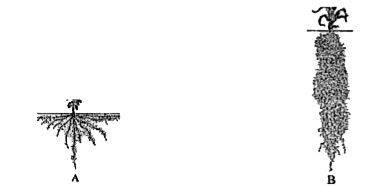Mass differs from weight because
weight is a force whereas and mass is not a force.
the mass of an object is always more than its weight
mass can be expressed only in the metric system
there is no difference.
The correct Answer is:A
Step-by-Step Solution:
1. Understanding Mass and Weight:
- Mass is a measure of the amount of matter in an object and is an intrinsic property of that object. It does not change regardless of location.
- Weight, on the other hand, is the force exerted by gravity on that mass. It is dependent on both the mass of the object and the acceleration due to gravity (g).
2. Defining the Relationship:
- The relationship between weight (W) and mass (m) can be expressed by the formula:
W=m⋅g
- Here, g is the acceleration due to gravity, which is approximately 9.8 m/s² on Earth.
3. Analyzing the Options:
- Option 1: "Weight is a force whereas mass is not a force."
- This is true. Weight is indeed a force (measured in Newtons), while mass is a scalar quantity (measured in kilograms).
- Option 2: "Mass of an object is always more than its weight."
- This is incorrect. Mass is not compared to weight in this way; they are different quantities.
- Option 3: "Mass can be expressed only in metric terms."
- This is also incorrect. Mass can be expressed in various units, including kilograms (kg), pounds (lbs), etc.
- Option 4: "There is no difference."
- This is false. There is a significant difference between mass and weight.
4. Conclusion:
- The correct answer is Option 1: "Weight is a force whereas mass is not a force."
---
- Mass is a measure of the amount of matter in an object and is an intrinsic property of that object. It does not change regardless of location.
- Weight, on the other hand, is the force exerted by gravity on that mass. It is dependent on both the mass of the object and the acceleration due to gravity (g).
- The relationship between weight (W) and mass (m) can be expressed by the formula:
W=m⋅g
- Here, g is the acceleration due to gravity, which is approximately 9.8 m/s² on Earth.
- Option 1: "Weight is a force whereas mass is not a force."
- This is true. Weight is indeed a force (measured in Newtons), while mass is a scalar quantity (measured in kilograms).
- Option 2: "Mass of an object is always more than its weight."
- This is incorrect. Mass is not compared to weight in this way; they are different quantities.
- Option 3: "Mass can be expressed only in metric terms."
- This is also incorrect. Mass can be expressed in various units, including kilograms (kg), pounds (lbs), etc.
- Option 4: "There is no difference."
- This is false. There is a significant difference between mass and weight.
- The correct answer is Option 1: "Weight is a force whereas mass is not a force."
Topper's Solved these Questions
- FORCE AND PRESSURE BOOK - MTG IIT JEE FOUNDATIONCHAPTER - FORCE AND PRESSURE EXERCISE - EXERCISE (MULTIPLE CHOICE QUESTIONS LEVEL-2)
22 Videos
- FORCE AND PRESSURE BOOK - MTG IIT JEE FOUNDATIONCHAPTER - FORCE AND PRESSURE EXERCISE - EXERCISE (MATCH THE FOLLOWING)
1 Video
- FORCE AND PRESSURE BOOK - MTG IIT JEE FOUNDATIONCHAPTER - FORCE AND PRESSURE EXERCISE - NCERT SECTION
19 Videos
- FOOTSTEPS TOWARDS NEETBOOK - MTG IIT JEE FOUNDATIONCHAPTER - FOOTSTEPS TOWARDS NEETEXERCISE - MCQ
45 Videos
- FRICTION BOOK - MTG IIT JEE FOUNDATIONCHAPTER - FRICTION EXERCISE - OLYMPIAD/HOTS CORNER
15 Videos
Similar Questions
Knowledge Check
Cleavage differs from mitosis because
AIn cleavage there is no growth phaseBIn cleavage consumption of O2 of increasesCIn cleavage nucleus-cytoplasmic ratio increasesDAll the above.Lanthanoids and actinoids differ from each other because
Aof the presence of partially filled outermost shellsBactinoids are radioactive in natureCthey show common oxidation state of + 3Dboth are known as inner-transition elementsTyrypsin differs from pepsin because it digests :
ACarbohydrate in alkaline medium in stomachBProtein, in alkaline medium in stomachCProtein, in acidic medium of stomachDProtein , in alkaline medium in duodenum
Trypsin differs from pepsin because it digests :
View SolutionMeiosis and mitosis differ from each other because in meiosis
View SolutionEpistasis differs from dominance because
View SolutionMeiosis-II differs from mitosis because meiosis-II
View SolutionKaryokinesis differ from cytokinesis because it involves
View Solution

